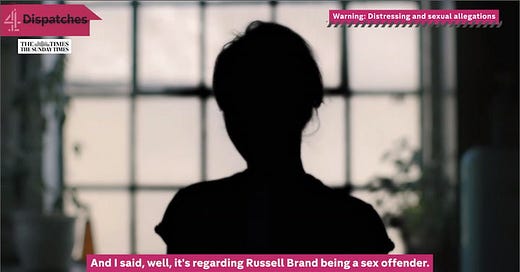Russell Brand is the latest male celebrity accused of rape, sexual assault, and emotional abuse. His response mirrors many other men; he denies the abuse, attacks the media, and places himself into the role of the victim, otherwise known as DARVO (Deny, Attack, Reverse Victim and Offender). The abuse in question spans from 2006 to 2013 and was allegedly experienced by five women, including one woman who was a 16-year-old child at the time of the abuse (Brand was allegedly 31). This child abuse was allegedly disclosed in 2020 to a talent agency, Tavistock Wood, who have now cut all ties with Brand. Brand has denied all allegations and is supported by self-proclaimed misogynist Andrew Tate and also Elon Musk.
Many of those around Brand knew what was allegedly going on but apparently failed to act. Why? Why are powerful men protected? Why do people enable abusers and fail to hold them accountable? Rather than Brand being fired after a number of sexist episodes – he was not only rehired but given promotions on other platforms, rewarding his behaviour.
He paints himself as an innocent, falsely accused man who has done no wrong, persecuted for speaking out against powerful media institutions. This incident is not the first time we have seen DARVO, and certainly not the first celebrity to use it. Brand being accused of abuse by anonymous women who received no compensation for their stories, are anonymous, and only stand to gain vitriolic responses shows that it is unlikely they were propped up by the media establishment to get back at a Z-list celebrity.
Brand, 48, presents himself as very, very "promiscuous" and only having relationships which are "absolutely, always consensual." He presents the allegations of abuse as attacking him for his non-mainstream views. There is a world of difference between promiscuity and allegedly raping and sexually assaulting women and grooming a 16-year-old child over the course of three months. He attacks the validity of the allegations by implying they are not made to hold him accountable but to silence him on other topics unrelated to abuse. Shifting the issue away from his abuse is how he positions himself as the real victim and the victims (and media outlets they utilise) who speak out against him as his persecutors.
While there has been a positive and supportive response to the survivors, there is still a significant presence of backlash online, which will only serve to further discourage and distress survivors. A large amount of backlash seeks to question why the complainants did not report their allegations to the police?
So, why didn't they report it? Only a small percentage of abuse is ever reported (see Rape Crisis statistics, 2023); even then, only a minuscule amount is prosecuted. Even when survivors report to the police, they describe not being believed. Baroness Casey's report on the Met showed that the force is institutionally misogynist and needs to change, which many women recognise. Police regularly disbelieve and dismiss reports either the survivor experienced regret over consensual sex, or she made the incident up. This victim-blaming and delegitimisation is reflective of the process in court - re-traumatising and rife with rape victim tropes. The justice system is so flawed that women and girls have no trust in the system- there is no recourse for justice. Why would survivors report when they fear they will be disbelieved and attacked?
Social media and other outlets provide opportunities for survivors to speak out against injustice and push for accountability without having to rely on the broken justice system (whether criminal, family or civil). The media presents an effective and far-reaching alternative to share experiences and call for action. The MeToo movement created an uprising of survivors pushing for accountability, not just for individual abusers but institutional accountability as well. Women's voices are at the heart of such powerful systemic change. Journalists have done amazing work in investigating abuse, which is what the police should be doing. It is no wonder that so-called 'trial by social media' occurs when the police remain unable or unwilling to help.
Thank you to Rosamund Urwin for gathering evidence and giving a voice to women, and thank you to the survivors who shared their stories.



